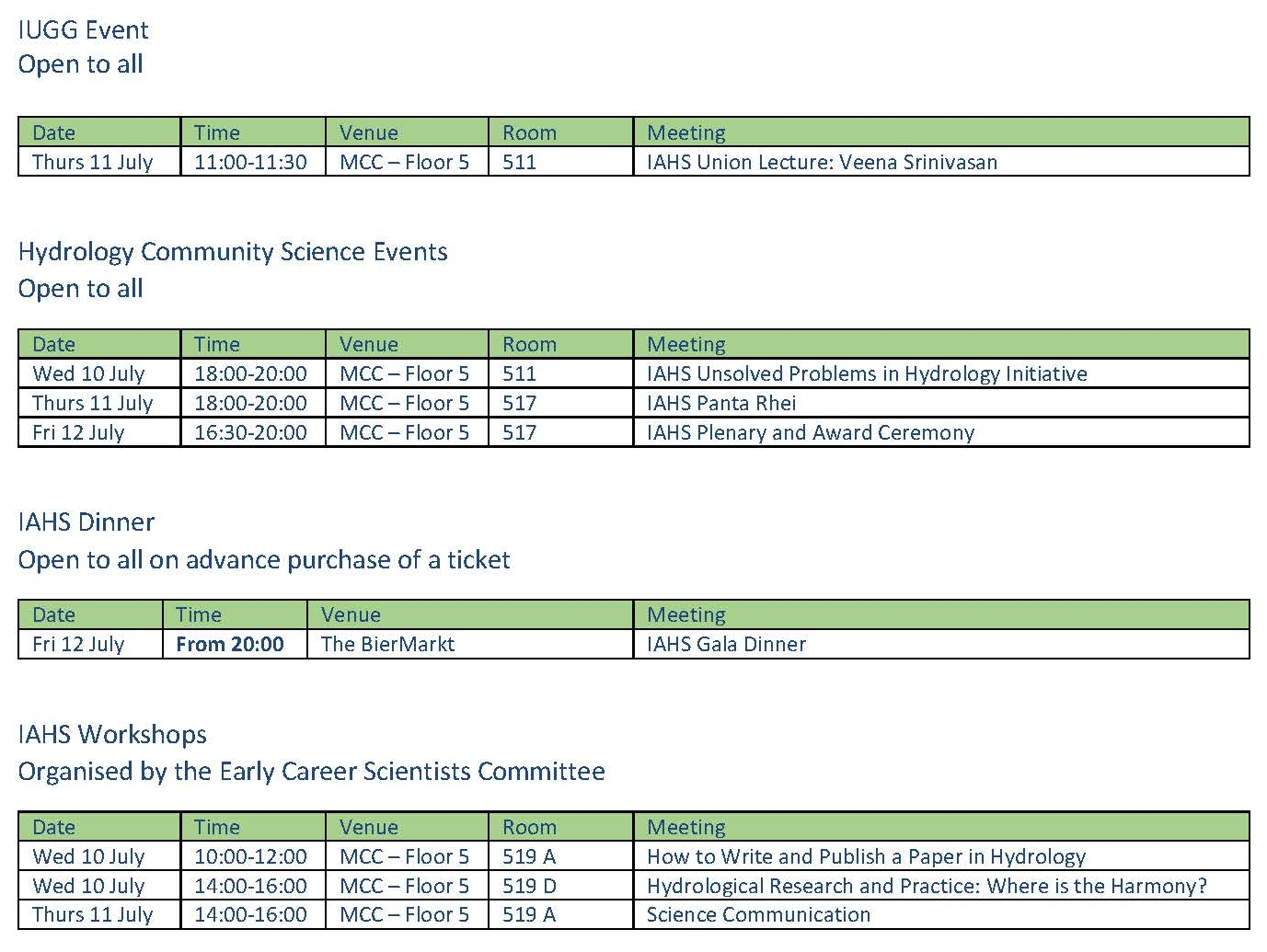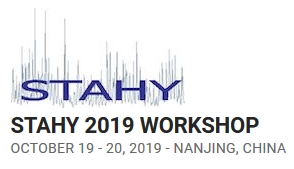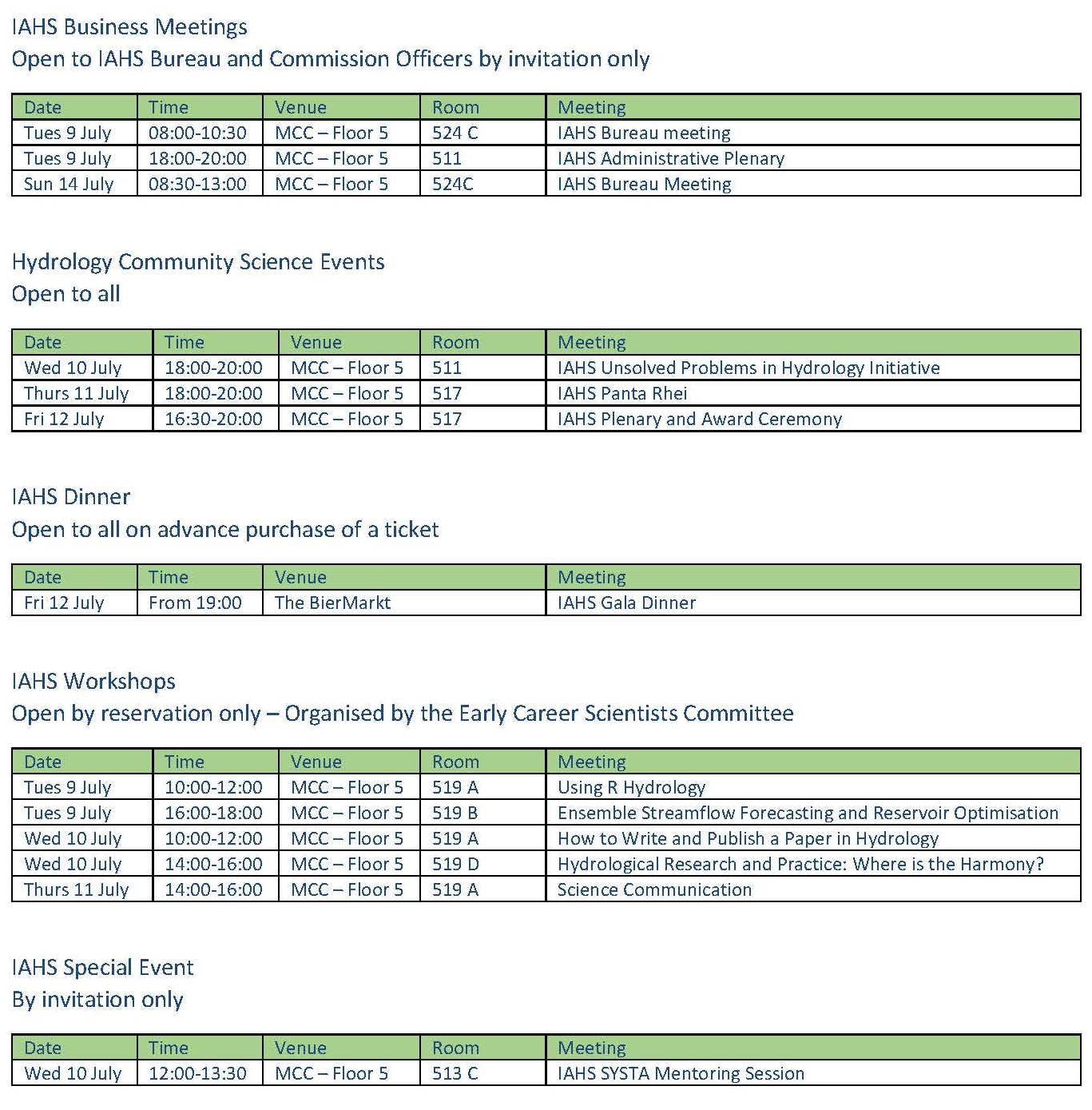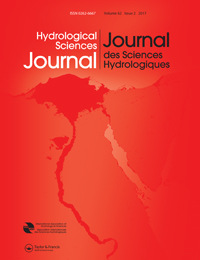IAHS News
IAHS events at IUGG2019 from July 10

"Beyond 100: The next century in Earth and Space Science"
Details of the IAHS symposia can be found here: http://iugg2019montreal.com/h.html
A Searchable schedule is available at: https://www.czech-in.org/cmPortalV15/CM_W3_Searchable/iugg19/normal#!sessionschedule
IAHS activities are continuing well at the General Assembly.
Highlight of today is the Unsolved Problems in Hydrology meeting in room 511 - all welcome.
The Gala Dinner will be held on Friday July 12th from 8pm - tickets are available from Claire Lupton, Executive Secretary of IAHS on the IUGG booth in the Exhibition Hall (#503).
Here is an update of events for the remainder of the week.

STAHY Abstract submission deadline extended to July 15
 The tenth edition of the STAHY International Workshop, STAHY 2019, is organized by the International Commission on Statistical Hydrology (ICSH) of the International Association of Hydrological Sciences (IAHS), and Hohai University.
The tenth edition of the STAHY International Workshop, STAHY 2019, is organized by the International Commission on Statistical Hydrology (ICSH) of the International Association of Hydrological Sciences (IAHS), and Hohai University.

For more information see the STAHY2019 website - http://www.stahy2019.org/
General topics include:
Big data, data mining & assimilation in hydrology
Extreme hydrological and meteorological events under climate change
Hydrological prediction and its uncertainty
Hydrological design and risk assessment under changing environment
Eco-hydrological regime changes and uncertainty assessment under human activities
STAHY 2019 will be held in Nanjing, China from October 19 - 20, 2019. The workshop venue will be the College of Hydrology and Water Resources, Hohai University.
On the day before this workshop (October 18), an Early Career Course and a short reception for the early career members of the STAHY will be held. All young hydrological scholars are welcome to participate in this event.
Important dates:
(1) Abstract submission deadline: June 30, 2019 (Extended to July 15, 2019)
(2) Notification of acceptance: July 15, 2019
(3) Early bird registration: August 15, 2019
(4) STAHY workshop:
Arrive, Reception: October 18, 2019
Plenary Sessions & Breakout Group Discussion: October 19-20, 2019
(5) Early career course:
Arrive, Reception: October 17, 2019
Presentations & Discussion: October 18, 2019
IAHS events at IUGG2019

"Beyond 100: The next century in Earth and Space Science"
The 27th IUGG General Assembly will be held July 8-18, 2019 at the Palais des Congrès in Montréal, Québec, Canada. This is a special opportunity for participants from around the world to come together and share their science and culture. 2019 marks the 100th anniversary of IUGG; we will look back on the accomplishments of the previous century of Earth and space science research, and forward to the next century of scientific advancement. Join us for a host of scientific activities, including special public lectures, keynote Union lectures and a wide variety of themed sessions.
For more information see the event website: http://iugg2019montreal.com/
The IAHS programme will be over the first half of the Assembly i.e. 9-14 July 2019.
Details of the IAHS symposia can be found here: http://iugg2019montreal.com/h.html
A Searchable schedule is available at: https://www.czech-in.org/cmPortalV15/CM_W3_Searchable/iugg19/normal#!sessionschedule
Other activities:

More information on the IAHS Workshops organised by the Early Career Committee can be found at:
YHS post on IAHS workshops at IUGG 2019 - https://younghs.com/2019/06/13/iahs-workshops-at-iugg-2019-in-montreal/
And on the @YoungHydrology Twitter feed - https://twitter.com/YoungHydrology/status/1145666882374160384
IAHS Dinner
The IAHS Gala Dinner will be held on Friday 12th July directly after the plenary and award ceremony at the BierMarkt (https://www.thebiermarkt.com/en/locations/montreal.html). Tickets are $80 CAD (inc. taxes) and include two drinks as well as buffet starters, choice of main course and desserts. More information about the menu and how to purchase tickets is available at https://iahs.info/About-IAHS/IAHS-at-IUGG2019/IAHS-Gala-Dinner-2019/
2019 International Hydrology Prize medals
The award ceremony will be held on Friday July 12th 2019 during the IAHS plenary at the IUGG General Assembly in Montreal, Canada.
The 2019 recipients of the IAHS-UNESCO-WMO International Hydrology Prize are:
Dooge medal - Alberto Montanari, at the Department of Civil, Chemical, Environmental and Material Engineering, University of Bologna, Italy
Volker medal - Jan Szolgay, at the Slovak Technical University, Faculty of Civil Engineering, Department of Land and Water Resources Management, Slovakia
Nominations for the annual Prize are made by National Committees to IAHS, National Committees to the UNESCO-IHP or National Hydrological Advisors to the WMO, and forwarded to the Secretary General of IAHS for consideration by the Nomination Committee. The Committee consists of the President and a Vice-President of IAHS and representatives of UNESCO and WMO.
As of 2014, two medals are awarded under the International Hydrology Prize: the Dooge medal and the Volker medal. Both medals are intended to distinguish outstanding achievements by hydrological scientists but with a different focus. The Dooge medal is aimed at fundamental contributions to the science of hydrology, whereas the Volker medal is aimed at outstanding applications of hydrological science for the benefit of society at large.
https://iahs.info/About-IAHS/Competition--Events/International-Hydrology-Prize.do
Our warmest congratulations go to both recipients.
UPH update – Community Perspective paper published online
IAHS are pleased to announced the first publication in the Hydrological Sciences Journal from the Unsolved Problems in Hydrology (UPH) initiative launched by IAHS President Günter Blöschl at the 2017 IAHS Scientific Assembly in Port Elizabeth, South Africa. The authors' accepted version of ‘Twenty-Three Unsolved Problems in Hydrology (UPH) – a Community Perspective’ is now available open access at https://www.tandfonline.com/doi/full/10.1080/02626667.2019.1620507
The initiative was launched with a video outlining the new IAHS initiative is available on the IAHS YouTube channel. Discussion is encouraged via the LinkedIn Group IAHS – International Association of Hydrological Sciences and information displayed on the IAHS website https://iahs.info/IAHS-UPH.do.
This paper is the outcome of a community initiative to identify major unsolved scientific problems in hydrology motivated by a need for stronger harmonisation of research efforts. The procedure involved a public consultation through on-line media, followed by two workshops through which a large number of potential science questions were collated, prioritised, and synthesised. In spite of the diversity of the participants (230 scientists in total), the process revealed much about community priorities and the state of our science: a preference for continuity in research questions rather than radical departures or redirections from past and current work.
This publication is the beginning of a process ran by our learned societies (IAHS and partners). The next meeting will be held during the IUGG General Assembly in Montreal (July 10th 2019) and we look forward to further publications.
Questions remain focussed on process-based understanding of hydrological variability and causality at all space and time scales. Increased attention to environmental change drives a new emphasis on understanding how change propagates across interfaces within the hydrological system and across disciplinary boundaries. In particular, the expansion of the human footprint raises a new set of questions related to human interactions with nature and water cycle feedbacks in the context of complex water management problems. We hope that this reflection and synthesis of the 23 unsolved problems in hydrology will help guide research efforts for some years to come.
IAHS Announce the winner of the 2019 Tison Award
The jury of the IAHS Tison award for young hydrologists have identified the 2019 winning paper as:
Sandra Pool, Marc Vis & Jan Seibert (2018) Evaluating model performance: towards a non-parametric variant of the Kling-Gupta efficiency, Hydrological Sciences Journal,
63:13-14, 1941-1953, DOI: 10.1080/02626667.2018.1552002
This award is prestigious with a 1000 US$ prize and a 1 year subscription to HSJ sponsored by Taylor & Francis the publisher of Hydrological Sciences Journal.
Our congratulations go to authors Sandra Pool and Marc Vis who are eligible to receive the award.
The paper is free to view on Taylor & Francis online:
DOI: 10.1080/02626667.2018.1552002
The IAHS Tison Award, established in 1982, aims to promote excellence in research by young hydrologists. The Award is granted for an outstanding paper published by IAHS in a period of two years previous to the deadline for nominations. The description of the award is available at https://iahs.info/About-IAHS/Competition--Events/Tison-Award.do
1 week left for early-bird savings for IUGG2019
REGISTER Now and Save!!!
Do not forget to register for the 27th IUGG General Assembly before the early-bird deadline closes at 23:59 (EDT) on April 9.
Register today and save!
Workshops and Fieldtrips are online!
Accommodation
2019 Summer Schools
Please find below announcements of two Summer Schools.
The Summer School on Runoff Predictions in Ungauged Basins (PUB) will run at the TU Wien, Austria from July 1-5, 2019. The purpose of the Summer School is to learn methods for estimating runoff characteristics in the absence of local runoff observations.
http://www.waterresources.at/fileadmin/user_upload/Flyer_Summer_School_PUB_2019_Electronic.pdf
The 10th Annual Catchment Science Summer School will run at the University of Birmingham UK from September 1-6, 2019. The course is designed for PhD students and Post Docs in catchment science. The course is taught by Jeff McDonnell, Chris Soulsby, Jan Seibert, Ilja van Meerveld, David Hannah, Stefan Krause and many others. It is co-sponsored by the Global Institute for Water Security at the University of Saskatchewan, the University of Aberdeen, University of Zurich and Humboldt University. Course details can be found at:
https://www.usask.ca/watershed/teaching/catchment-science-summer-school.php.
Please forward to potentially interested people.
Best wishes
Günter Blöschl
IAHS President
Less than 24 hours remaining

Abstract submission deadline
Abstracts must be submitted via the online submission system.
The deadline is March 1st, 2019 (12:00 CET).
Don’t miss your chance to be part of the 27th IUGG General Assembly!
Travel grant deadline
To submit an application for a travel grant to attend IUGG2019, please click here.
Deadline to submit a travel grant application is March 1st, 2019 (12:00 CET).
For additional information on the 27th IUGG General Assembly, please contact [email protected]
For more information on IAHS symposia visit - http://iugg2019montreal.com/h.html
See you in Montreal!
IUGG’s Centennial Anniversary

Formed in Brussels, Belgium, on 28 July 1919, the International Union of Geodesy and Geophysics (IUGG) celebrates its 100th anniversary in 2019. The centennial year marks an important milestone for IUGG. Since its inception as a union of international scientific associations, IUGG has evolved into a prominent scientific organization promoting Earth and space sciences worldwide in the complex political, economic and scientific landscapes of the 20th and the beginning of the 21st centuries. IUGG’s mission is to advance, strengthen and promote Earth and space sciences for the benefit of humanity through international research cooperation and education, and to communicate the knowledge to governments and policymakers. For the decades ahead, IUGG envisions a future Earth that is environmentally sustainable and where societies are resilient against natural hazards. We celebrate the IUGG centennial not only to remind geoscientists how important international scientific cooperation is and how IUGG science and science diplomacy have developed over the last century, but also to think collectively about future scientific developments, international scientific initiatives, and finding solutions to the urgent problems of our society, especially to those related to the 2030 UN Agenda for Sustainable Development. We are looking at the past in order to develop a new future for Earth and space sciences and to promote science for the benefit of all.
To celebrate the Centennial of the Union, IUGG established a Task Force to develop a program for celebrations around the world for 2018-2019. In 2018, several conferences/symposia and a summer school for early career scientists were held in China, Japan, Mexico, Turkey, and the USA. The program for this year includes:
- 27th IUGG General Assembly, Montreal, Canada, 8-18 July 2019;
- Celebration of the IUGG Centennial at UNESCO, Paris, France, 29 July 2019;
- Several meetings in Europe, South America, and the Middle East;
- A special volume on “The International Union of Geodesy and Geophysics: From Different Spheres to a Common Globe” will be published as a part of the peer-reviewed journal History of Geo- and Space Sciences.
As a part of this program, a website dedicated to the IUGG Centennial has been developed and is now open to the public. Please visit http://100.iugg.org/ to learn more about the history of IUGG. We hope all visitors to the website, especially IUGG scientists from all nations and geoscientific disciplines, will enjoy this wonderful 100-year journey through space and time and appreciate the work of several generations of Earth and space scientists, who voluntarily contributed their time and efforts to the development of international cooperation in geosciences.
Michael G. Sideris, IUGG President
Alik Ismail-Zadeh, IUGG Secretary-General

